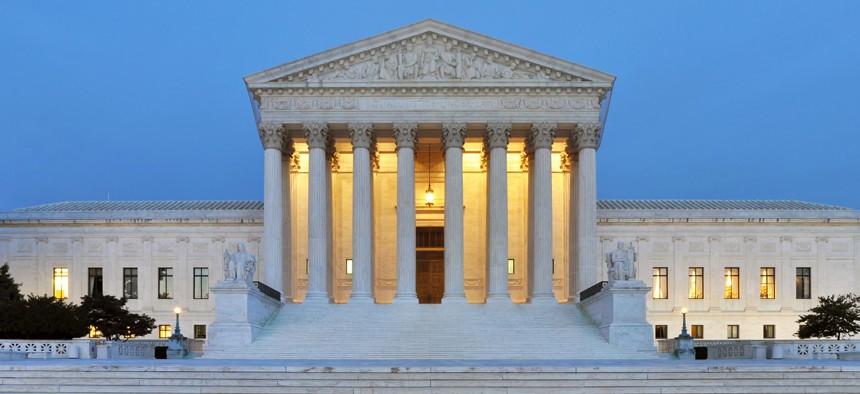Supreme Court Rules that Absentee Ballots in One State Must Be Signed by a Witness

The Supreme Court ruled in favor of South Carolina Republicans in a dispute over witness signatures on absentee ballots. Shutterstock
Democrats warned that requiring absentee ballots to be signed by a witness would pose a voting barrier during the pandemic. Republicans said it will prevent fraud.
The U.S. Supreme Court on Monday ruled that South Carolina can reinstate its requirement that absentee ballots be signed by a witness, overturning a lower court ruling that blocked the law in light of concerns that it could cause a significant barrier to voting during the pandemic.
South Carolina’s witness law has been in place since 1953. Under the policy, voters with absentee ballots sign an oath that signifies the ballot enclosed in the envelope is theirs and then must include a second signature of a witness certifying that the voter is who they say they are.
During the coronavirus pandemic, all voters in the state qualify for absentee ballots. Leading up to the primary election in June, several Democratic leaders in the state warned that requiring a witness signature could potentially be dangerous during the pandemic, as people who live alone might risk infection to find a witness. Republicans countered that witnesses could aid in investigations of voter fraud.
The South Carolina Democratic Party, along with the Democratic National Committee and several individual voters, filed a federal lawsuit about the requirement in advance of the state’s primary election, leading to a judge preventing the requirement from being enforced in the primary. That lawsuit cited Dr. Joseph John, Jr., an epidemiologist at the Medical University of South Carolina, who said that witness requirements may cause unnecessary risk. “For those voters who live alone, casting a ballot without a witness signature carries less risk than casting a ballot with a witness signature,” he said.
U.S. Judge J. Michelle Childs disagreed with state officials that the witness requirement could be helpful in investigating cases of voter fraud. “The fact the witness requirement may provide a lead to investigate absentee fraud is undercut by an utter dearth of absentee fraud,” Childs wrote.
On appeal, the witness requirement was blocked again. But several state officials and the South Carolina Republican party asked the Supreme Court to intervene. The group, which included the executive director of the South Carolina Election Commission, the speaker of the state House of Representatives, and the president of the state Senate, wrote in their request that prohibiting “a neutral, nondiscriminatory, easy-to-comply-with law—especially in this election, with its expanded absentee voting in the midst of a global pandemic and turbulent political climate—serves only to increase the odds of voter confusion, distrust in election results, and skepticism of the democratic process.”
They argued that because there is no definition of what a witness is, the requirement does not present a burden. Witnesses could be “family, friends, co-workers, congregants, teachers, waiters, bartenders, gymgoers, neighbors, grocers and more,” they wrote.
The Supreme Court sided with the Republicans and reinstated the witness requirement, but made exceptions for ballots that had already been mailed back, as well as any ballots received within two days of their decision. According to the state Election Commission, any ballots received before or on October 7 “will be counted regardless of whether the return envelope has a witness signature.”
More than 200,000 absentee ballots have been mailed and 18,000 have been returned so far. Three of the high court’s justices—Clarence Thomas, Samuel Alito, and Neil Gorsuch—said that they would have preferred that no ballots without the witness signatures be counted. Justice Brett Kavanagh, in the explanation for his vote, said that federal courts should not intervene in election proceedings so close to November 3 and should instead allow state governments to “keep or to make changes to election rules to address Covid-19.”
State Republican party chairman Drew McKissick celebrated the Supreme Court’s decision. “Despite the Democrats’ efforts to hijack a pandemic and use it to meddle with our election laws, they’ve lost,” he said in a statement. “We’re pleased the Supreme Court reinstated the witness signature requirement and recognized its importance in helping to prevent election fraud.”
By contrast, state Democratic party chairman Trav Robertson expressed disappointment with the ruling. “Our hope is that no one gets Covid-19 trying to find a witness,” he said in a statement. “We are disappointed but elections have consequences.”
Twelve states, including Mississippi, Louisiana, Wisconsin, and Virginia, require a witness signature on ballots. Some require the ballot to be notarized or have strict requirements around who can serve as a witness. Alabama requires either notarization or two witnesses.
Some of these policies have been challenged in court lately. Alabama’s law was upheld by the Supreme Court in July, but the high court in August declined to get involved in litigation that sought to reinstate Rhode Island’s law requiring two witnesses or a notary, which was blocked by a lower court earlier in the summer.
Emma Coleman is the assistant editor for Route Fifty.
NEXT STORY: Work Zone Crashes Climb During Pandemic, Even as Traffic Ebbs






